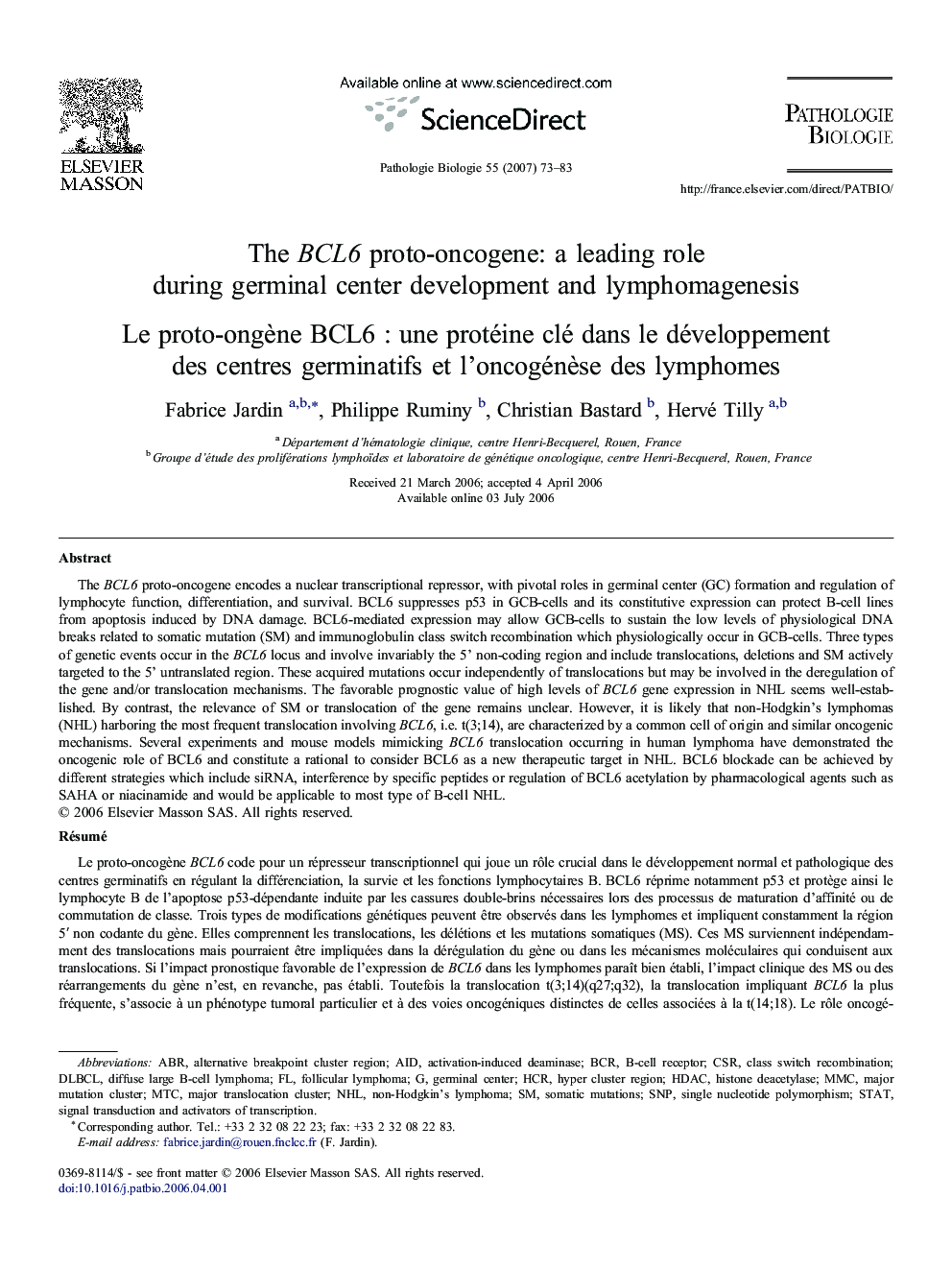| کد مقاله | کد نشریه | سال انتشار | مقاله انگلیسی | نسخه تمام متن |
|---|---|---|---|---|
| 4136766 | 1271937 | 2007 | 11 صفحه PDF | دانلود رایگان |

The BCL6 proto-oncogene encodes a nuclear transcriptional repressor, with pivotal roles in germinal center (GC) formation and regulation of lymphocyte function, differentiation, and survival. BCL6 suppresses p53 in GCB-cells and its constitutive expression can protect B-cell lines from apoptosis induced by DNA damage. BCL6-mediated expression may allow GCB-cells to sustain the low levels of physiological DNA breaks related to somatic mutation (SM) and immunoglobulin class switch recombination which physiologically occur in GCB-cells. Three types of genetic events occur in the BCL6 locus and involve invariably the 5' non-coding region and include translocations, deletions and SM actively targeted to the 5' untranslated region. These acquired mutations occur independently of translocations but may be involved in the deregulation of the gene and/or translocation mechanisms. The favorable prognostic value of high levels of BCL6 gene expression in NHL seems well-established. By contrast, the relevance of SM or translocation of the gene remains unclear. However, it is likely that non-Hodgkin's lymphomas (NHL) harboring the most frequent translocation involving BCL6, i.e. t(3;14), are characterized by a common cell of origin and similar oncogenic mechanisms. Several experiments and mouse models mimicking BCL6 translocation occurring in human lymphoma have demonstrated the oncogenic role of BCL6 and constitute a rational to consider BCL6 as a new therapeutic target in NHL. BCL6 blockade can be achieved by different strategies which include siRNA, interference by specific peptides or regulation of BCL6 acetylation by pharmacological agents such as SAHA or niacinamide and would be applicable to most type of B-cell NHL.
RésuméLe proto-oncogène BCL6 code pour un répresseur transcriptionnel qui joue un rôle crucial dans le développement normal et pathologique des centres germinatifs en régulant la différenciation, la survie et les fonctions lymphocytaires B. BCL6 réprime notamment p53 et protège ainsi le lymphocyte B de l'apoptose p53-dépendante induite par les cassures double-brins nécessaires lors des processus de maturation d'affinité ou de commutation de classe. Trois types de modifications génétiques peuvent être observés dans les lymphomes et impliquent constamment la région 5′ non codante du gène. Elles comprennent les translocations, les délétions et les mutations somatiques (MS). Ces MS surviennent indépendamment des translocations mais pourraient être impliquées dans la dérégulation du gène ou dans les mécanismes moléculaires qui conduisent aux translocations. Si l'impact pronostique favorable de l'expression de BCL6 dans les lymphomes paraît bien établi, l'impact clinique des MS ou des réarrangements du gène n'est, en revanche, pas établi. Toutefois la translocation t(3;14)(q27;q32), la translocation impliquant BCL6 la plus fréquente, s'associe à un phénotype tumoral particulier et à des voies oncogéniques distinctes de celles associées à la t(14;18). Le rôle oncogénique de BCL6 a pu être récemment démontré dans des modèles expérimentaux, et permet d'envisager une thérapie ciblée sur BCL6. Le blocage de BCL6 peut être ainsi obtenu par des ARN d'interférence, par des peptides empêchant spécifiquement le recrutement de co-répresseurs, ou en régulant le niveau d'acétylation de la protéine à l'aide d'agents pharmacologiques tel que SAHA ou la niacinamide.
Journal: Pathologie Biologie - Volume 55, Issue 1, February 2007, Pages 73–83